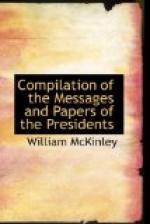The death of Queen Victoria caused the people of the United States deep and heartfelt sorrow, to which the Government gave full expression. When President McKinley died, our Nation in turn received from every quarter of the British Empire expressions of grief and sympathy no less sincere. The death of the Empress Dowager Frederick of Germany also aroused the genuine sympathy of the American people; and this sympathy was cordially reciprocated by Germany when the President was assassinated. Indeed, from every quarter of the civilized world we received, at the time of the President’s death, assurances of such grief and regard as to touch the hearts of our people. In the midst of our affliction we reverently thank the Almighty that we are at peace with the nations of mankind; and we firmly intend that our policy shall be such as to continue unbroken these international relations of mutual respect and good will.
Theodore Roosevelt.
White house, December 16, 1901.
To the Senate and House of Representatives:
I transmit herewith a report from the Secretary of State, with accompanying papers, showing that a civil government for Puerto Rico has been organized in accordance with the provisions of the act of Congress approved April 12, 1900, entitled “An act to provide revenues and a civil Government for Puerto Rico, and for other purposes,” and that the legislative assembly of Puerto Rico has enacted and put into operation a system of local taxation to meet the necessities of the government of Puerto Rico.
Theodore Roosevelt.
White house, March 11, 1902.
To the Senate of the United States:
I return without approval Senate bill, No. 1258 entitled “An act to remove the charge of desertion from the naval record of John Glass.”
There can be no graver crime than the crime of desertion from the Army or Navy, especially during war; it is then high treason to the nation, and is justly punishable by death. No man should be relieved from such a crime, especially when nearly forty years have passed since it occurred, save on the clearest possible proof of his real innocence. In this case the statement made by the affiant before the committee does not in all points agree with his statement made to the Secretary of the Navy. In any event it is incomprehensible to me that he should not have made effective effort to get back into the Navy.
He had served but little more than a month when he deserted, and the war lasted for over a year afterwards, yet he made no effort whatever to get back into the war. Under such circumstances it seems to me that to remove the charge of desertion from the Navy and give him an honorable discharge would be to falsify the records and do an injustice to his gallant and worthy comrades who fought the war to a finish. The names of the veterans who fought in the civil war make the honor list of the Republic, and I am not willing to put upon it the name of a man unworthy of the high position.




